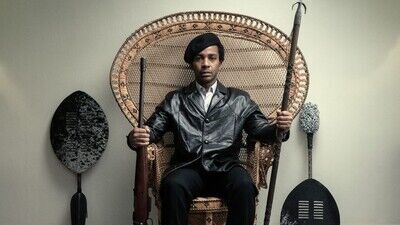Despite his high opinion of himself as a leftist radical, Schneider isn’t a particularly deep man: He becomes instantly addicted to the air of danger Newton presents, as if he’s a new exotic street drug. That hollowness presents a difficult challenge for Nivola; he needs to be interesting enough in his dimwittedness for smarter viewers not to wonder why this series isn’t solely from Newton’s perspective. The series often tests our patience with his thread, as the character pushes his friends to the limit of even their empathy—but he lands that tension like few actors can. Nivola gives being “well-meaning” a startling dramatic and vulnerable edge that mostly keeps one interested in Schneider far beyond what the character on the page has earned.
It helps that we’re essentially watching a mish-mash of “Argo” and “Winning Time.” We get the thrills of the former through Schneider hatching a plan to create a fake movie that’ll be a cover to smuggle Newton out of the country. The humor of seeing Schneider, Blauner, and Newton outwit the FBI agent tailing them is a wonderful piece of escalating laughs, as are the cast of oddball characters who enter this world: from a fidgety drug runner to winking references to the Hollywood scene.
But Newton is ultimately the star: The nonlinear timeline is mostly successful at orienting us to his psychological downfall. Newton is understandably skittish. After all, by 1974, when the series chiefly takes place, Malcolm X, MLK, and Fred Hampton had already been assassinated. Some of the Black Panther leadership, such as Eldridge Cleaver, had fled the country. Put that together with the crushing effects of COINTELPRO—the American government’s surveillance program used to undermine Black leaders—and you can understand how Newton would not only develop a serious drug habit but also spiral. Holland has always been a beguiling actor, but he’s particularly visceral and kinetic in Newtown’s fits of paranoia and distrust. Holland’s face drops, his eyes become defeated and vacant, and Newton seems to rapidly age under the stress.
Holland gives definition to Newton’s interior, even when the series is far more interested in his exterior angst. We don’t get enough time between Newton and his father (an always dependable Glynn Turman). The ghost of a fallen young comrade that persistently haunts Newton is similarly underwritten. You come to wish the series’ creators cut back on the showy fireworks and zeroed in on developing quieter, more effective moments that could further build out Newton the man and his importance on a movement that seemed to be crumbling along with him.

